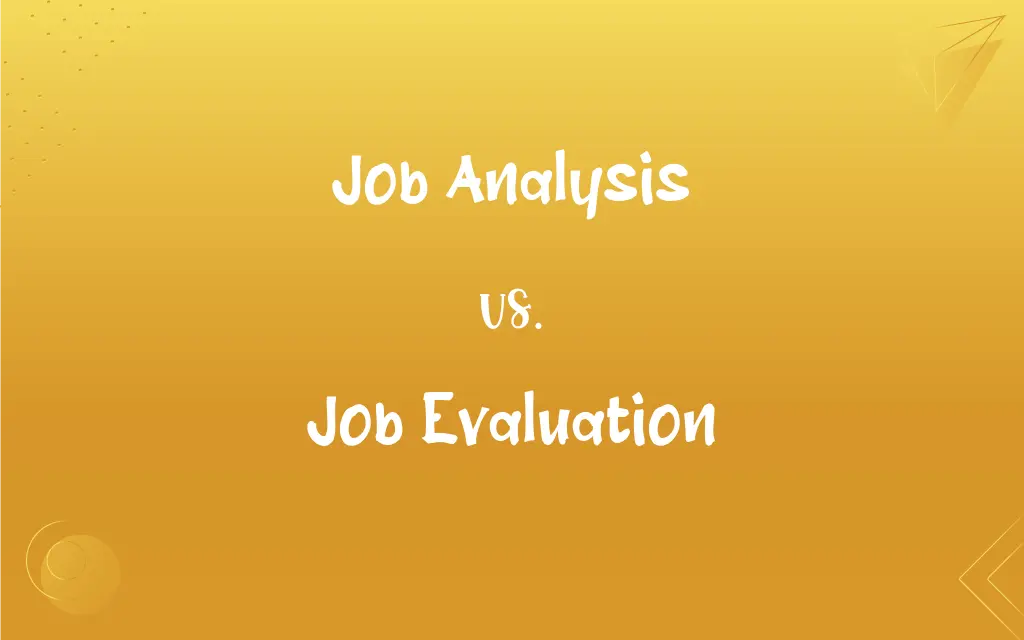Job Analysis vs. Job Evaluation: What's the Difference?
Edited by Harlon Moss || By Janet White || Updated on November 9, 2023
"Job Analysis" systematically studies and gathers information about a job's duties and requirements, while "Job Evaluation" determines the value or worth of a job in relation to other jobs within an organization.

Key Differences
"Job Analysis" is a detailed process where a specific job's functions, responsibilities, and requirements are studied. This thorough examination aids in understanding the exact nature of the job. Conversely, "Job Evaluation" takes a broader perspective, aiming to assess the relative value or worth of that job within the framework of an organization.
"Job Analysis" will typically focus on areas such as the tasks to be performed, the skills required, the conditions under which work is performed, and any tools or equipment needed. "Job Evaluation", however, centers on comparing jobs to one another, often to design equitable compensation structures or to set up hierarchical structures within a company.
When performing "Job Analysis", HR professionals might engage in interviews, observations, or surveys to gain a comprehensive understanding of the job. In contrast, "Job Evaluation" methods might involve ranking, classification, or point-factor systems to determine a job's relative value within an entity.
Fundamentally, while "Job Analysis" delves deep into the intricacies of a single job, "Job Evaluation" provides a platform for comparing multiple jobs, assisting in informed decision-making related to compensation, promotions, and organizational structure.
Comparison Chart
Purpose
Understand the job's nature and requirements.
Determine a job's value within an organization.
ADVERTISEMENT
Focus
Specific job duties, skills, and conditions.
Comparison of jobs and their relative worth.
Outcome
Detailed job description.
Hierarchical job ranking or grade.
Methods
Interviews, observations, surveys.
Ranking, classification, point-factor systems.
Application
Recruitment, training, performance appraisal.
Compensation planning, organizational hierarchy design.
Job Analysis and Job Evaluation Definitions
Job Analysis
A method to understand a job's nature, its challenges, and the necessary skills.
The manager wanted a Job Analysis done before restructuring the department.
ADVERTISEMENT
Job Evaluation
An assessment to rank jobs based on their significance and impact on organizational goals.
The results of the Job Evaluation led to a revision of the promotion criteria.
Job Analysis
An in-depth examination of what a job entails, from tasks to tools needed.
Job Analysis revealed that the role required more technical expertise than initially thought.
Job Evaluation
A systematic way of determining the value of a job in relation to others within an organization.
The HR team used Job Evaluation to set competitive salary ranges.
Job Analysis
The process of collecting information about the tasks, responsibilities, and qualifications associated with a specific job.
Before advertising a new position, a thorough Job Analysis was done to ensure the right candidates applied.
Job Evaluation
A method used to understand the relative importance of various jobs within a company.
Job Evaluation highlighted the need for better compensation for certain technical roles.
Job Analysis
An evaluation of job functions to better inform recruitment and training processes.
The findings from the Job Analysis were crucial for the training module's development.
Job Evaluation
The process of comparing jobs to establish a justified pay hierarchy.
Through Job Evaluation, the company ensured equitable pay across departments.
Job Analysis
The systematic study of a job to determine its various duties and requirements.
The HR department conducted a Job Analysis to create a comprehensive job description.
Job Evaluation
An analysis to ensure that jobs are compensated based on their relative contributions.
Job Evaluation is a key tool in addressing pay equity issues within the firm.
FAQs
Why is "Job Evaluation" significant for organizations?
"Job Evaluation" helps organizations establish a fair and competitive compensation structure based on job value.
Can "Job Evaluation" be used to address pay equity issues?
Yes, "Job Evaluation" can highlight discrepancies in pay and help address equity issues.
Does "Job Analysis" involve assessing a job's value within a company?
No, "Job Analysis" focuses on understanding the job's duties and requirements, not its relative value.
What's a common outcome of "Job Analysis"?
A common outcome of "Job Analysis" is a detailed job description.
Does "Job Evaluation" focus on individual job performance?
No, "Job Evaluation" focuses on the job's relative worth, not on individual performance.
Is "Job Analysis" beneficial for training and development purposes?
Yes, "Job Analysis" identifies skills and duties, guiding training content and methods.
How does "Job Evaluation" aid in designing an organizational hierarchy?
"Job Evaluation" ranks jobs based on their value, helping in defining roles and their placement in a hierarchy.
What's the primary goal of "Job Analysis"?
The primary goal of "Job Analysis" is to understand and document the specifics of a particular job.
How does "Job Analysis" benefit performance appraisals?
"Job Analysis" offers clear performance criteria, providing a basis for fair evaluations.
What's a key distinction between "Job Analysis" and "Job Evaluation"?
"Job Analysis" studies the intricacies of a single job, while "Job Evaluation" compares the relative value of different jobs.
How can "Job Analysis" assist in recruitment?
"Job Analysis" provides clear job requirements, aiding in targeted recruitment and candidate selection.
What methods are typically used in "Job Evaluation"?
Common methods include ranking, classification, and point-factor systems.
Does "Job Evaluation" always lead to pay increases?
Not necessarily. "Job Evaluation" aims for fair compensation, which might mean adjustments up or down.
How often should "Job Analysis" be revisited?
"Job Analysis" should be updated with significant job changes or shifts in organizational goals.
How do "Job Analysis" and "Job Evaluation" together support HRM?
"Job Analysis" provides clarity on roles, and "Job Evaluation" ensures equity, together enhancing recruitment, training, and compensation processes.
Is compensation the only application for "Job Evaluation"?
While compensation is a primary application, "Job Evaluation" also informs promotions, hierarchy design, and other HR decisions.
In what scenarios might "Job Evaluation" be crucial?
Mergers, restructuring, or significant growth might necessitate "Job Evaluation" to ensure alignment and equity.
Can "Job Analysis" be done for all types of jobs?
Yes, "Job Analysis" can be adapted for various roles, from manual to managerial.
Can "Job Analysis" be used to assess job satisfaction?
While "Job Analysis" focuses on job details, it can provide insights into factors that might influence job satisfaction.
Are the results of "Job Evaluation" static?
No, "Job Evaluation" might need updates with organizational changes, market shifts, or job role alterations.
About Author
Written by
Janet WhiteJanet White has been an esteemed writer and blogger for Difference Wiki. Holding a Master's degree in Science and Medical Journalism from the prestigious Boston University, she has consistently demonstrated her expertise and passion for her field. When she's not immersed in her work, Janet relishes her time exercising, delving into a good book, and cherishing moments with friends and family.
Edited by
Harlon MossHarlon is a seasoned quality moderator and accomplished content writer for Difference Wiki. An alumnus of the prestigious University of California, he earned his degree in Computer Science. Leveraging his academic background, Harlon brings a meticulous and informed perspective to his work, ensuring content accuracy and excellence.































































